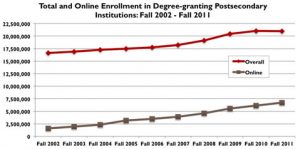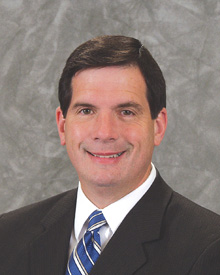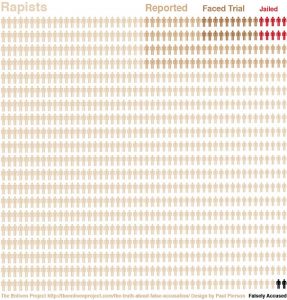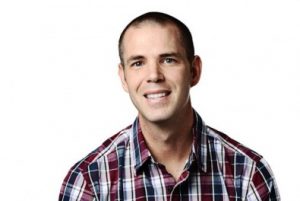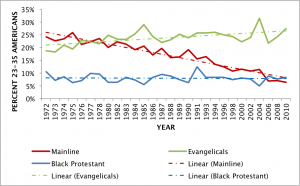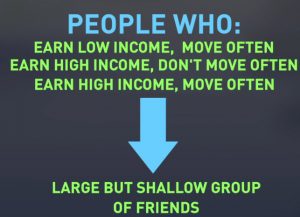In the 1970s, 80s, and 90s higher education was largely assumed as an on campus experience. As technology improved, distance education began evolving from the exchange of documents and media primarily via postal mail to online exchanges. During the 2000s and now in the 10s, the number of students in higher education taking at least one online course grew on an annual basis. It is reasonable to project that in the not too distant future a majority of students will complete at least Read More …
Trends
Executive Pastor Trends (#0983)
Thom Rainer, president and CEO of LifeWay Christian Resources, recently wrote about the role of executive pastor. The position itself is a relatively new construct, arriving in the latter half of the twentieth century. Initially attractive primarily to megachurches, the value of this position is now seen by congregations significantly smaller in size. This observation is one of five trends Rainer highlights: More executive pastors in smaller churches More executive Read More …
Beyond Pro-Choice / Pro-Life (#0979)
"Not in Her Shoes" is a new brief video (under 2 minutes) designed to encourage conversation about abortion by suggesting people move beyond the labels "pro-choice" and "pro-life" that "actually don't reflect how people feel about abortion." So What? Watch the video and ponder the argument advanced by Planned Parenthood. Do you believe that moving beyond the polarizing labels (pro-choice and pro-life) will help people have more in-depth and meaningful conversations about abortion? Why or Read More …
Church Renewal – Join the Conversation (#0978)
A week ago today Chaplain Mike, one of the principal bloggers on the popular Evangelical/post-Evangelical Internet Monk site, shared his summary of my thoughts on the future of the church as expressed in a series of blog posts written last year. In addition to framing my series as a "perspective on the future of the American church from a younger leader in the mainline Protestant world," Chaplain Mike shared his take on how my thoughts relate to what others are saying now and Read More …
The Saddest Graph (#0977)
A week or so ago I read Dylan Matthews' Washington Post piece, "The Saddest Graph You'll See Today." The article focuses on an infographic illustrating the small percentage of rapes that are reported and an even smaller numbers of rapists who are jailed. Recognizing the complexity of collecting data about and unreported rape, I hesitated to share this specific explanation without some form of methodological disclaimer. Interestingly when I returned to the article, Read More …
Remaining Relevant (#0969)
Justin Lathrop, executive search consultant at the Vanderbloemen Search Group, recently suggested five ways churches can remain relevant: Leverage the strengths of church networks Engage social media Expand online offerings, including worship services Consider the possibilities of strategic church mergers Welcome the diverse population of the community So What? Many of the items on Lathrop's list focus on structural matters: the possibility of belonging to multiple Read More …
2012 in 4 Minutes (#0965)
2012 was quite a year. The following video reviews the year's big news stories in 4 minutes. So What? As we near the end of the first week of 2013, I encourage you to remember many of the significant events of 2012 especially those that impacted you. Share a few of the stories featured in the video recap that impacted you the most. Share a few of the most memorable moments from your own life experiences in 2012. What word or phrase best describes your experience of 2012? Read More …
Shifts in Young Adult Protestantism (#0964)
The graph at right illustrates the shifts in young adult (ages 23-35) Protestant affiliation between 1972 and 2010 as compiled by Lifeway Research using data from the General Social Survey. Overall, during the "last 30 years, mainline protestantism is dying, black protestantism is steady, and evangelicalism is growing." More specifically, among young adults: Mainline Protestantism declined dramatically: identification dropped from 24% to 6% while worship attendance was cut in half Read More …
Top 10 Religious Stories of 2012 (#0963)
According to members of the Religion Newswriters Association (he world’s oldest and largest professional association for journalists who write about religion), the top 10 religious news stories of 2012 are U.S. Catholic bishops lead opposition to Obamacare requirement that insurance coverage for contraception be provided for employees. The government backs down a bit, but not enough to satisfy the opposition. A Pew Forum on Religion & Public Life survey shows that “nones” is the Read More …
Socioeconomic Status & Facebook Friends (#0957)
According to new research conducted by the University of Virginia and the London Business School, the size of one's social network is correlated to one's socioeconomic status. Wealthier individuals are more likely than those who are less affluent to have large but shallow Facebook connections while those who earn low incomes are more likely to have small but deep groups of Facebook friends. Low income workers who move often are an exception to this generalization as is Read More …
